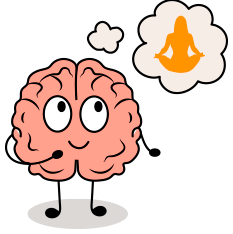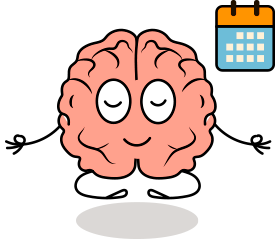In this article, I go over the research studies on the proven health benefits of meditation and how it just may be what you’re looking for to heal. Meditation has long been practiced for its various physical, mental, and emotional benefits. In recent years, scientific studies have started to reveal just how effective meditation can be for one’s overall well-being. Incorporating meditation into your daily routine can bring numerous health benefits, from stress reduction to improved sleep quality.
Understanding the science behind meditation can help people appreciate its true value and impact. As more research is conducted, the proven advantages of meditation continue to expand, making it a versatile and accessible tool for enhancing one’s health. By practicing various meditation techniques, participants can learn to harness mindfulness, a key component that contributes to improved mental and emotional balance.
Key Takeaways
- Meditation offers a range of health benefits, including stress reduction and better sleep quality.
- Scientific studies are increasingly validating the positive effects of meditation on overall well-being.
- Learning and incorporating various meditation techniques can lead to a more balanced mental and emotional state.
Understanding Meditation

Nature of Meditation
Meditation is a practice that helps individuals develop focus, attention, and emotional stability. Through this exercise, practitioners cultivate mental clarity and emotional calm by training their minds to be more present and aware. Meditation has been shown to offer numerous health benefits, including reducing stress, anxiety, and depression, improving sleep quality, and even assisting in weight control (source).
Types of Meditation
There are various types of meditation techniques, each with its unique approach and purpose. Some common types include:
- Concentration meditation: This form of meditation focuses on cultivating mental discipline. Practitioners concentrate on a single point, such as their breath, a mantra, or a sound, to block out distractions and enhance mental focus (
source). - Mindfulness meditation: This practice encourages individuals to develop a constant and non-judgmental awareness of their thoughts, emotions, and bodily sensations. The goal is to observe and accept these experiences without engaging or reacting to them.
- Loving-kindness meditation: Also known as “metta” meditation, this technique fosters feelings of compassion and love towards oneself and others. Practitioners begin by cultivating loving-kindness for themselves before gradually extending it to loved ones, acquaintances, and even adversaries.
Fundamentals of Meditation

Regardless of the specific technique, a few fundamental principles apply to the practice of meditation:
- Setting: Find a quiet space free of distractions. You can sit on a cushion, chair, or floor, as long as you maintain a comfortable and upright posture. Some meditation styles, such as walking meditation, incorporate movement, but generally, remaining still is essential.
- Duration: Beginners can start with as little as five minutes per session and gradually increase the duration over time. Consistent practice, even in short sessions, is more critical than meditating for extended periods sporadically.
- Focus: Choose a meditation object, such as your breath, a mantra, or visualization, to anchor your attention. If your mind wanders, gently bring it back to the object of focus.
- Acceptance: Approach your meditation practice with an attitude of kindness and non-judgment. Allow your thoughts and emotions to arise and pass without evaluating or dwelling on them.
By following these fundamentals and exploring various meditation techniques, individuals can find the best approach that resonates with their personal needs and preferences, fostering a consistent and beneficial meditation practice.
Science Behind Meditation

Brain and Meditation
Meditation has a significant impact on the brain and its functions. Research has shown that regular meditation practice can increase the thickness of the prefrontal cortex and improve grey matter density in key areas responsible for cognitive functions like learning, memory, and emotional regulation. This increased brain connectivity leads to better concentration, mental focus, and overall cognitive performance.
Mindfulness and the Mind
Mindfulness, a core aspect of meditation, involves paying deliberate attention to the present moment without judgment. Research suggests that mindfulness practice can contribute to managing anxiety, stress, and depression. One of the ways this works is by activating the parasympathetic nervous system, which helps promote a sense of relaxation and well-being. Practicing mindfulness also trains the mind to be more aware of its thoughts and emotions, helping individuals respond to stressors with greater emotional balance and resilience.
Meditation and the Nervous System

The nervous system plays a crucial role in how meditation impacts our bodies and minds. Studies have shown that meditation helps reduce the production of stress hormones, such as cortisol, by calming down the sympathetic nervous system. This can lead to improved sleep quality, reduced blood pressure, and lower levels of inflammation in the body.
Furthermore, meditation is revealed to have a direct influence on the vagus nerve, a critical component of the parasympathetic nervous system. By stimulating the vagus nerve through regular meditation practice, individuals can experience various positive effects on their mental and physical health, including better mood regulation, improved digestion, and a strengthened immune system.
Health Benefits of Regular Meditation
Meditation is a practice that has been associated with a variety of health benefits. Research has shown that regular meditation can have positive effects on both physical and mental health. Some of these benefits include a reduction in chronic pain, improved blood pressure, and enhanced immune system function.
One of the most significant health benefits of meditation is its ability to reduce stress and anxiety. When practiced regularly, meditation helps to lower cortisol levels in the body, which has been linked to hypertension and heart disease. In fact, meditation has been shown to be an effective method in managing high blood pressure, reducing the risk of heart attacks and stroke.
Meditation can also provide relief from chronic pain, which can be debilitating for many people. By promoting relaxation and mindfulness, meditation encourages individuals to become more aware of their bodies and the sensations they experience. Through this increased awareness, individuals can learn to cope with pain in a more effective manner which can lead to reduced reliance on pain medication.
The immune system is another aspect of physical health that can be positively impacted by regular meditation. Studies have suggested that meditation can increase the production of natural killer cells, which play a critical role in the body’s defense against viruses and cancer cells. This boost in immune system function can contribute to overall well-being and reduce vulnerability to disease.
In terms of mental health, meditation has shown potential in improving cognitive function and reducing the risk of developing dementia. Through consistent practice, meditation enhances one’s ability to focus and maintain attention, which can lead to better memory and concentration skills. Additionally, meditation can help support emotional regulation and resilience, making it an effective tool for managing stress and promoting mental well-being.
Overall, the health benefits of regular meditation are evident, touching on various aspects of physical and mental health. By incorporating meditation into a daily routine, individuals can experience improved well-being and a higher quality of life.
Meditation for Mental Well-being

Reducing Stress
Meditation is a powerful tool for reducing stress and promoting mental well-being. By spending a few minutes each day practicing mindfulness meditation, individuals can lower their stress levels and achieve a sense of calm. This natural stress reduction technique works by bringing one’s awareness to the present moment, allowing them to acknowledge their thoughts and feelings without judgment. Consequently, meditation helps in dialing down the body’s stress response.
Dealing with Anxiety
Anxiety is a common mental health issue that benefits from regular meditation. Through mindfulness meditation, individuals can reduce anxiety symptoms by focusing on their breath and observing their thoughts and feelings without judgment. This practice trains the mind to let go of negative thought patterns and promotes a sense of relaxation and mental clarity.
Improving Sleep Quality
Meditation can also improve sleep quality and help with insomnia. By practicing relaxation techniques, such as deep breathing and progressive muscle relaxation, individuals can enhance their sleep by reducing tension and calming their minds. This enables them to fall asleep more easily and have a more restful night’s sleep.
Boosting Happiness and Positive Emotions
Aside from reducing negative emotions such as stress and anxiety, meditation can also foster positive feelings and emotions. Regular meditation practice encourages individuals to cultivate compassion and acceptance, which contributes to overall well-being and happiness. Moreover, meditation increases self-awareness, making it easier for individuals to identify areas of their life they wish to improve.
Enhancing Self-awareness

Enhancing self-awareness is another key benefit of meditation. Mindfulness meditation requires individuals to pay close attention to their thoughts and emotions, which helps them gain a deeper understanding of their own mental patterns and behaviors. By developing self-awareness, individuals can make more informed choices and take control of their mental health.
In summary, meditation has numerous benefits for mental well-being, including reducing stress and anxiety, improving sleep quality, boosting happiness and positive emotions, and enhancing self-awareness. By incorporating regular meditation into their daily routine, individuals can experience positive changes in their mental health and overall well-being.
Practicing Mindfulness
Practicing mindfulness can create a sense of calm and presence in one’s life. By implementing various mindfulness techniques, individuals can enhance their focus and attention span, resulting in numerous proven health benefits. This section will explore three key mindfulness practices: Mindful Breathing, Mindful Listening, and Mindful Observation.
Mindful Breathing
A foundational practice in mindfulness is Mindful Breathing. It entails focusing one’s attention on the sensation of the breath as it flows in and out of the body. By observing thoughts and feelings without judgment, individuals can bring their awareness back to the present moment. To practice mindful breathing:
- Find a comfortable and quiet space to sit or lie down.
- Close your eyes and take a few deep breaths, noting the sensation of the air entering and leaving your nostrils or the rise and fall of your chest.
- Allow your breath to return to its natural rhythm and continue to observe each inhalation and exhalation, gently guiding your attention back to the breath if your mind wanders.
Mindful Listening
Mindful Listening is another essential practice to enhance mindfulness. It involves fully immersing oneself in the sounds and vibrations of the present moment. This practice can improve attention, focus, and emotional regulation. To engage in mindful listening:
- Find a quiet space and either sit or stand comfortably while allowing your body to feel relaxed.
- Pay close attention to the sounds around you, whether they’re natural sounds like birds chirping or man-made ones such as traffic noise.
- Avoid judgment and remain open to the sounds, letting them come and go without trying to control or alter them.
Mindful Observation
Lastly, Mindful Observation involves intentionally directing one’s focus toward a specific object or aspect of their environment. This practice can expand awareness and increase attention span. To practice mindful observation:
- Choose an object in your surroundings, such as a plant, piece of artwork, or even your own hand.
- Observe the object using all your senses, taking note of its color, texture, shape, and any other attributes that capture your attention.
- If your mind wanders, gently redirect your focus back to the object.
Integrating Meditation into Your Routine

Meditation offers numerous proven health benefits, including reduced stress, improved mental clarity, and better emotional well-being. To obtain these benefits, it’s essential to establish a consistent meditation routine. This section offers guidance on choosing the right technique, building discipline, and scheduling regular sessions.
Choosing the Right Technique
There are various meditation techniques available, each designed to help you achieve a specific goal. The key is to find a method that suits your needs and preferences. For instance, mindfulness meditation helps you remain present, whereas loving-kindness meditation focuses on cultivating compassion.
- Mindfulness meditation: Involves observing thoughts and emotions without judgment, while focusing on your breath or another point of focus. A good option for beginners, mindfulness meditation allows the practitioner to develop awareness and self-compassion.
- Loving-kindness meditation: Also known as Metta meditation, this technique involves silently repeating phrases of goodwill towards oneself and others. It aims to foster self-compassion and promote positive thoughts and emotions.
- Body scan meditation: This method involves mentally scanning your body, bringing awareness to areas of tension, and releasing it. Body scan meditation encourages relaxation and stress reduction.
Building Discipline
Like any other skill, meditation requires consistent practice and discipline to improve and maintain its benefits. Here are a few tips to build discipline:
- Start small: Begin with brief sessions, such as 5-10 minutes per day, and gradually increase the duration as you grow more comfortable.
- Set realistic expectations: Understand that progress takes time, and remind yourself that even experienced meditators encounter challenges.
- Stay consistent: Try incorporating meditation into your daily routine at a specific time, like after waking up or before going to bed.
Scheduling Regular Sessions
Consistency is key to growing and maintaining the benefits of meditation. Consider these tips when planning your meditation sessions:
- Find a quiet space: Choose a designated area with minimal distractions to practice meditation.
- Schedule a specific time: Pick a time that works best for you, such as mornings or evenings, and commit to meditating every day.
- Use reminders: Utilize calendar events, smartphone apps, or other tools to remind you of your scheduled sessions.
By incorporating these guidelines, you can effectively integrate meditation into your daily routine and reap its many health advantages.
Does Meditation Help Healing? https://1111newme.com/2023/06/25/does-meditation-help-healing-the-evidence-and-research/


2 replies on “Proven Health Benefits of Meditation: A Guide to Health”
Your writing is like a breath of fresh air in the often stale world of online content. Your unique perspective and engaging style set you apart from the crowd. Thank you for sharing your talents with us.
What a fantastic piece of writing! I found the material much easy to grasp after reading your explanation. One thing that stood out to me was the way you supported your claims with examples from everyday life. You obviously spent a lot of time on this, both researching and writing it. Your generosity in sharing this knowledge is greatly appreciated.